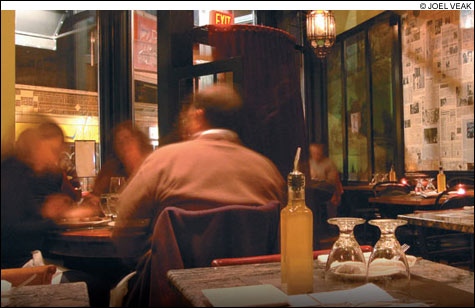Around the turn of the millennium, we food writers were spilling way too much ink (fine, wasting our inkjet cartridges) on the cult of the neighborhood place. The comfy, low-key 21st-century answer to the flashy, celebrity-chefdriven destinations of the ’80s and ’90s, it was your kitchen away from your kitchen, minus the messes and mistakes. The food was hearty, the folks easygoing, the tabs low. Simple.
Turns out, however, that simplicity isn’t that simple, at least not in Greater Boston. For one thing, as the city’s neighborhoods shape-shift, the good old joints they contain can stiffen up or become more supple with use. Take the North End, where pretty much every place was a neighborhood place until recently; now, post–Big Dig gentrification is gradually erasing the family-run trattorias, sketching a series of contemporary destinations in their place. Or the South End, whose transformation from gritty turf to bohemian enclave to yuppie haven is finally so complete that no eatery is safe from widespread overexposure (as the Franklin Café’s original customers will no doubt angrily attest). For another thing, no-fuss comfort is in the eye of the beholder, not to mention his/her palate and wallet; one man’s Locke-Ober is another man’s Silvertone. (Heck, if I had the funds, you’d be finding me slumped over my massive martini in an armchair at Julien Bar & Lounge night after night.)

|
What exactly, then, does the term “neighborhood place” mean to Bostonians now? I put the question to four chef-restaurateurs whose own establishments run the gamut of possible definitions. The South End’s Christine Didiuk, for instance, runs what may be the exemplar of the genre, the Dish (253 Shawmut Avenue, Boston, 617.426.7866) — an adorably cozy source for the sort of fancy snack you crave all too regularly (damn that potato-bacon pizza). Conversely, Anthony Caturano’s Prezza (24 Fleet Street, Boston, 617.227.1577) is by most standards a capital-D Destination in the North End — yet since it boasts one of the neighborhood’s few fully stocked liquor cabinets, it enjoys a scene worthy of a corner grill (only with betterdressed barflies). Whether Caturano’s sophomore venture, Copia (100 City Square, Charlestown, 617.242.6393), will execute a similar feat in its noman’s land between the North End and Charlestown’s main strip remains to be seen — though the success of a place like La Morra (48 Boylston Street, Brookline, 617.739.0007), Josh Ziskin’s go-to at the rougher edge of Brookline Village, shows it can be done. And then there’s Jamaica Plain’s Douglas Organ, who eschewed the acclaim of the eating elite in favor of hometown props when he turned dark, dreamy Arbor into bright, bustling Café D (711 Centre Street, Jamaica Plain, 617.522.9500). Here’s what they had to say.
How do you define the term “neighborhood place” in general?
Anthony Caturano: Cheers hit it on the spot: you want to go where everybody knows your name. It’s all about being remembered, being appreciated.
I just got back from [the Caribbean island] Nevis. We went to all these different beach bars, but there was this one — we walked in the first day, and within two minutes the bartender was giving me a hard time, breaking my balls, having fun. And after that, we were in there every day, laughing it up with this guy. You know, you have six beach bars in a row, and one of ’em is jam-packed. Why is that? Each one is dirtier than the next one; each one serves piña coladas. It’s because of that guy.
Josh Ziskin: It’s a place supported by people that live in the area, by regular customers. It’s like ringing someone’s doorbell — it’s not appropriate these days to just stop in and hang out on someone’s couch. Instead, they come here. We have a great core of Brookline residents. They’ll come in at 10, after dinner somewhere else, or after a play, for dessert or a drink, and their servers recognize them and I recognize them. They can just have a bowl of pasta at the bar and watch the [open] kitchen. On a Tuesday, people just want to be comfortable.
Douglas Organ: It’s just a matter of accessibility, of an environment that makes you feel like you belong there, that doesn’t even have any airs about being a fancy place to come. Christine Didiuk: Well, people are getting away from formal dining during the week. They want to go where the staff knows what they like. Just to have someone say, “Here, you might like this,” or, “Give this a taste; this is for your palate.”
Did you set out to have a neighborhood place? If not, how did you start out?
CD: Yes. At that time in my life, I was younger, dating, hanging out with friends, working in the industry. I liked to go to a place and have the bartender know who I was, have the manager know who I was. I lived in South Boston and there were a couple of places like that.